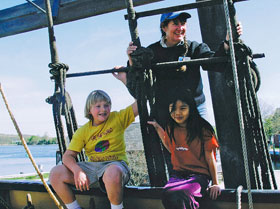  |
| HOME | THIS ISSUE | CALENDAR | GRANTS | BACK ISSUES | < BACK | NEXT > |
Melville expert has hands-on experience sailing the high seasby Karen Singer - February 27, 2006 |
||||
|
Mary K Bercaw Edwards is a literary scholar specializing in maritime authors, but she’s no landlubber. A Herman Melville expert and 2004 president of the Melville Society, Bercaw Edwards has logged more than 56,000 miles at sea. She has sailed around the world and taught literature of the sea aboard schooners. As head of the demonstration squad at Mystic Seaport, she has climbed high into the rigging of the “only whaling ship left in the world” to show visitors the daily duties of 19th-century sailors. Now Bercaw Edwards’ is an associate professor of English in the new maritime studies program at UConn’s Avery Point campus. “She was a dream candidate when it came to hands-on experience,” says Helen Rozwadowski, director of the maritime studies program, the most recent of three undergraduate majors offered at the Avery Point campus. (The others are coastal studies and American studies.) Bercaw Edwards teaches upper-level courses on Melville, American literature, and American studies, and is developing the experiential education component of the program. “We want to have students going on field trips, looking at artifacts, using charts and navigational equipment, getting out in boats, and going to sea,” she says. Several U.S. colleges offer semesters at sea or marine science majors, but UConn’s Avery Point campus is the only school with a four-year undergraduate maritime studies major and interdisciplinary curriculum emphasizing humanities and social sciences, Rozwadowski says. Nearly a dozen students have enrolled since the program started in 2004; three have already graduated. Though most students are “typical” undergraduates with a penchant for boats and oceans, the current crop includes a student who dropped out of college for a decade to run a restaurant, and a former navy nuclear aircraft expert eager to study nautical literature. Bercaw Edwards calls the Avery Point campus “a perfect place” for maritime studies because of its coastal location. “You can watch square riggers, tug boats, and the ferry go by,” she says. “We’re right next to Mystic Seaport, and within three hours’ drive of Pittsfield, Mass., where Melville wrote Moby-Dick.” The distance between Mystic Seaport and UConn became even closer when the institutions agreed recently to share resources, including the creation of two summer internships for Avery Point students. Bercaw Edwards spent her high school years earning her sea legs aboard a 38-foot sailboat. Her father, a marine technician for General Motors, decided to take his family on the voyage of a lifetime after his job ended when the company shut down its marine research division. “We left from California, where I grew up, went to the South Pacific and Pitcairn Island, from there to Tahitian Islands, then down to New Zealand and Australia, across the Indian Ocean to South Africa and the Cape of Good Hope, then to the West Indies, up to Massachusetts, down the East Coast, and back to California,” Bercaw Edwards says. Along the way, she and her two siblings “did a lot of math, learned how to navigate, learned history, geography, and social science … and read a book about every country we visited.”
Her fascination with Melville began at Northwestern University. “I planned to study Henry James, but my advisor suggested Melville,” she says, adding she soon was hooked on the subject by the “great Melville scholar” Harrison Hayford. “I earned all my degrees there, got to work with him all the way through, and had my dissertation published as a book.” Bercaw Edwards has since written or edited several other books and dozens of articles on Melville, and has spent a considerable amount of time following in his footsteps. She has focused on Melville’s use of written sources – her first book, Melville’s Sources, was published by Northwestern University Press in 1987 – and the relationship between his time at sea and his works. Her second book, Herman Melville’s Whaling Years, completing work begun by Melville scholar Wilson Heflin in the 1930s and 1940s, was published in 2004. Bercaw Edwards recently returned from a South Pacific trip, where she was researching a book about Melville’s early novels. His first book, Typee, she explains, is a fictional account of living among the cannibals in the Marquesas after jumping ship from a whaler in the mid-19th century. She questions the long-established theories about where Melville spent his time and what he did during his month-long stay on Nuku Hiva in the Marquesas Islands in 1842, which became the basis of Typee. “It’s well known that Melville relied on written sources for other books … so it’s really intriguing and fun just to question whether he was actually in the Typee Valley,” Bercaw Edwards says. She’s trying to find the answer by scrutinizing original documents. “What we know about how Melville wrote his first book affects our perception of him as an artist,” she says. Melville is famous for borrowing accounts from other writers, but “the genius is how he takes these mundane sources and transforms them into books that are funny and rich and ask deep questions about human life,” she says. Before her recent faculty appointment, Bercaw Edwards was an associate professor-in-residence at UConn. Other previous teaching posts include senior lecturer in literature of the sea for the Williams College-Mystic Seaport program and lecturer in literature and the sea in the SeaQuarter program at Northeastern University. Bercaw Edwards admits she’s an anomaly, straddling the academic and nautical worlds. “On boats, there’s a lot of anti-intellectualism,” she says. “I’m out here to prove you can do both.” |
| ADVANCE HOME UCONN HOME |

